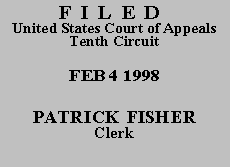

| LONNIE D. GODFREY,
Plaintiff-Appellant, v. KENNETH S. APFEL, Commissioner, Social Security Administration,(*) Defendant-Appellee. |
|
Plaintiff appeals from the district court's affirmance of the Commissioner of Social Security's decision to deny plaintiff's application for disability benefits. The district court affirmed and adopted the findings of the magistrate judge in finding that substantial evidence supported the Commissioner's decision. On appeal, we also review the entire record to determine whether the Commissioner's decision is supported by substantial evidence and whether the correct legal standards were applied. See Hawkins v. Chater, 113 F.3d 1162, 1164 (10th Cir. 1997). Concluding that the Commissioner's decision is both free of legal error and supported by "such evidence that a reasonable mind might accept as adequate," Pacheco v. Sullivan, 931 F.2d 695, 697 (10th Cir. 1991), we affirm the denial of benefits.
Plaintiff's application for disability benefits alleges disability since December 4, 1993, because of back problems, a stomach hernia, headaches, and numbness in his left leg. He also presented testimony complaining of carpal tunnel syndrome in his left hand. The Administrative Law Judge (ALJ) determined that plaintiff was unable to return to his past work of furniture delivery or pizza delivery/fast food worker. The ALJ then found at step five of the sequential analysis, see Williams v. Bowen, 844 F.2d 748, 750-52 (10th Cir. 1988), that plaintiff could perform the full range of sedentary work and established that such jobs exist in significant numbers in the national economy.
Plaintiff's argument centers around his carpal tunnel syndrome and its effects on his manual dexterity. He claims the ALJ did not properly take this into account in finding that plaintiff could perform the full range of sedentary work, and that the ALJ erred in relying on the Medical Vocational Guidelines (grids) because the manual limitation constitutes a nonexertional impairment. He also cites error in the hypotheticals posed to the vocational expert.
To the contrary, the ALJ specifically considered plaintiff's complaints relating to his left hand and the alleged effect on his residual functional capacity. The ALJ discredited plaintiff's subjective complaints, citing medical evidence indicating that plaintiff's left hand problems should not prohibit him from performing sedentary work. The ALJ did find that plaintiff may have limitations relative to his left hand, but that those limitations do not affect plaintiff's ability to perform sedentary work. Further, the ALJ's finding of some limitation is not inconsistent with his finding that plaintiff does not have a nonexertional impairment.
Our review of the record reveals substantial evidence supporting these findings.(1) Because the record contains substantial evidence that plaintiff's hand problems did not affect his residual functional capacity to perform sedentary work, the ALJ was correct to rely on the grids in finding that plaintiff was not disabled. See Glass v. Shalala, 43 F.3d 1392, 1396 (10th Cir. 1994). Finally, because the ALJ did not err in relying on the grids, he was not obligated to elicit vocational expert testimony and, therefore, plaintiff's assertion of impropriety in hypotheticals posed to the vocational witness is to no avail. See Trimiar v. Sullivan, 966 F.2d 1326, 1332 (10th Cir. 1992) (recognizing that vocational expert not needed when relying on grids). AFFIRMED.
Entered for the Court
Circuit Judge
*. Pursuant to Fed. R. App. P. 43(c), Kenneth S. Apfel is substituted for Shirley S. Chater, former Acting Commissioner of Social Security, as the defendant in this action.
**. This order and judgment is not binding precedent, except under the doctrines of law of the case, res judicata, and collateral estoppel. The court generally disfavors the citation of orders and judgments; nevertheless, an order and judgment may be cited under the terms and conditions of 10th Cir. R. 36.3.
1. We agree with plaintiff that the ALJ's finding that plaintiff was able to continue to perform his past work despite his hand problems, is not substantial evidence of plaintiff's residual functional capacity to perform sedentary work. Plaintiff's former work was not sedentary. The ALJ's findings were based on several other factors, however, that are supported by substantial evidence in the record.